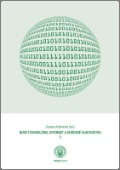Pavel Koukal
Full Text of Paper
- Source Type: Publication
- Document Type: Study
- Document Language: Czech
- Published on: 2019
- File Format: PDF
- File Size: 174 kB
In: ADAMOVÁ, Z. (ed.) Nové technológie, internet a duševné vlastníctvo 3. Trnava: Typi Universitatis Tyrnaviensis, spoločné pracovisko Trnavskej univerzity v Trnave a VEDY, vydavateľstva Slovenskej akadémie vied, 2019, pp. 9-39. ISBN 978-80-568-0181-9.
Summary: The aim of this paper is to analyze the constitutional background of the protection of the results of creative intellectual activity in the Czech Charter of Fundamental Rights and Freedoms. We will pay attention to the analysis of Art. 34 (1) of the Charter of Fundamental Rights and Freedoms, trying to explain why we regard it as a “mosaic principle”. This means that even though we can apply this provision directly [Art. 34 is not included in the list of rights mentioned in Art. 41 (1) of the Charter of Fundamental Rights and Freedoms of the Czech Republic], we must take into account also other constitutional principles such as protection of personality, protection of the property, freedom of artistic expression etc. In this context, the author of this paper emphasize that the Art. 34 (1) of the Charter of Fundamental Rights and Freedoms should be seen in the light of the international obligations of the Czech Republic. He also explains why we should interpret the Art. 34 (1) of the Charter of Fundamental Rights and Freedoms of the Czech Republic in the context of personhood not the utilitarian theory of the intellectual property protection. The personhood approach to the copyright protection, which is based on the Art. 15 (1) c) of the International Covenant on Economic, Social and Cultural Rights, originates in the German doctrine (Kant, Fichte), and from the constitutional point of view is based on the self-realization and self-identification of an individual. The right to protection of privacy concerns not only the protection of the “inner circle”, where an individual can live his or her personal life and exclude from it the entire outside world not included in this choice, but also the right to create and develop relationships with others people and the outside world. The protection of personality in the Charter of Fundamental Rights and Freedoms of the Czech Republic is governed, in particular, by Art. 10, the purpose of which is to provide space for the development and realization of the human personality. In the so-called informational self-determination (Art. 10 (3) of the Charter of Fundamental Rights and Freedoms), the author decides, in particular, whether his work is captured in a tangible form (i.e., whether the work leaves the author’s “inner world”). After the creation of the work, the author determines whether his work will be published at all (Sec. 11 (1) of the Czech Copyright Act), whether it will be published under his real name, under the pseudonym or whether the author remains anonymous (Section 11 (2) of the Czech Copyright Act).
URL: http://ntidv.iuridica.truni.sk/archive/ntidv-3/NTIDV-3-Koukal-Pavel.pdf
Bibliographic Citation
KOUKAL, P. Ochrana výsledků tvůrčí činnosti v Listině základních práv a svobod České republiky. In: ADAMOVÁ, Z. (ed.) Nové technológie, internet a duševné vlastníctvo 3. Trnava: Typi Universitatis Tyrnaviensis, spoločné pracovisko Trnavskej univerzity v Trnave a VEDY, vydavateľstva Slovenskej akadémie vied, 2019, pp. 9-39. ISBN 978-80-568-0181-9.
